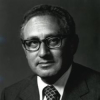Henry A. Kissinger

Henry A. Kissinger
Henry Alfred Kissingeris an American diplomat and political scientist. He served as National Security Advisor and later concurrently as United States Secretary of State in the administrations of presidents Richard Nixon and Gerald Ford. For his actions negotiating the ceasefire in Vietnam, Kissinger received the 1973 Nobel Peace Prize under controversial circumstances, with two members of the committee resigning in protest. Kissinger later sought, unsuccessfully, to return the prize. After his term, his advice has been sought by world leaders...
NationalityGerman
ProfessionStatesman
Date of Birth27 May 1923
CountryGermany
It is not unreasonable for us to desire some options. Some Europeans, I know, believe it is necessary that we guarantee our own destruction to give them the assurances they claim they need. However, to deprive ourselves of options is to paralyze us. ... What do we mean by control of escalation?
It is hard to believe that Kay is no longer among us. But in a way, she will never leave us. Her place in this country will not be filled, nor the void her death leaves on the lives of her friends,
Kay ennobled all of her human relationships, ... In the pain of this moment, none of us would trade places with those whose lives were never touched by Kay Graham.
For me, the tragedy of Vietnam was the divisions that occurred in the United States that made it, in the end, impossible to achieve an outcome that was compatible with the sacrifices that had been made, ... Late Edition with Wolf Blitzer.
I believe -- and certainly from everything I've been told about him -- that he's an honorable enough man so that he will carry out his assignment with ability and with care.
if East Pakistan becomes independent, it is going to become a cesspool. It's going to be 100 million people; they have the lowest standard of living in Asia. They are going to become a ripe field for communist infiltration.
I don't consider China a communist state, no. I know that sounds paradoxical, but it's my view.
The defining issue is that the government in Taiwan was considered to be the government of all of China, and the authorities in Beijing were not recognized as a government of China. So Taiwan was the residuary for all of China.
Certainly not a party of the workers and the peasants. In fact, Jiang Zemin in recent weeks has officially said that capitalists and the entrepreneurs should be enrolled in the Communist Party.
People are now starting to explain the Cold War. Even in the crises at that time the survival of millions of people was at stake. And we (the USA) had to threaten the other super power with retaliation to prevent it from doing something to us. Today we live in a world in which a lot of things are in flux. That creates a lot of fear. But it is also a time of great opportunity. And I would call on today's statesmen to not allow their thinking to be directed by fear.
In the 1960s, I would have considered China with its CPC an ideologically more dynamic country than the Soviet Union. But the Soviet Union was strategically more threatening.
I wouldn't say it's a split. It's a difference of emphasis. It does exist between, I would say, the State Department and the Defense Department.
What is applicable is to understand that first of all China has undergone a huge revolution in the last years. Anyone who saw China as I did in 1971 - and for that matter even in 1979, because not much had changed between 1971 and 1979 - and sees China today, knows one is in a different economic system.
When I first saw China, there were no automobiles. There were no supermarkets. There were no high-rise buildings. There were no consumer goods. There were no restaurants that were at least accessible that foreigners could see. It was a Stalinist society, and a very poor Stalinist society. So the economic system has totally changed, and the private sector in the economic system is now the dominant sector. It didn't exist at all as late as 1979.